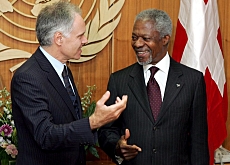Former Swiss ambassador sings Annan’s praises

The United Nations Security Council has officially nominated South Korean Foreign Minister Ban Ki-Moon as Kofi Annan's successor as UN secretary-general.
Jenö Staehelin, the first-ever Swiss ambassador to the UN, told swissinfo ahead of the announcement why Kofi Annan has been such an influential figure for Switzerland.
swissinfo: What is your assessment of the ten years of the UN with Kofi Annan at the helm?
Jenö Staehelin: The first five years were very positive. They ended with the UN and its secretary general receiving the Nobel Peace Prize in 2001.
The following years were dominated by the Iraq crisis, but Kofi Annan will go down in history as one of the great UN secretary-generals; he certainly left his mark.
swissinfo: What were his biggest setbacks?
J.S.: The role of the secretary-general is, by definition, a weak one. According to the UN charter, the secretary-general is the highest civil servant in the organisation. But it all depends on the respect they earn and the authority they can demonstrate.
During his first five-year term, thanks to his initiative and charisma, Annan was granted a certain degree of moral authority.
Then followed the crisis over the legitimacy of the military operation against Iraq. Annan defended his position that it was not possible to go to war without UN Security Council backing.
In so doing, he found himself disagreeing with the American administration, and from there arose many of his difficulties. You have to understand that without the United States the UN doesn’t exist.
On the other hand, the UN should not simply be a tool of American policy. The middle path is a very difficult one to tread – between being called America’s puppet and needing the Americans on board.
swissinfo: And did Kofi Annan actually find this middle ground?
J.S.: Today relations with the US have improved. But personally I think the role of the secretary-general is almost impossible to get right. It really is mission impossible. It’s amazing that there are still people ready to follow in his footsteps.
swissinfo: After ten years with Kofi Annan as head of the organisation, has the UN made any progress or has it simply ground to a standstill?
J.S.: It has made progress in so far as we can no longer imagine a world without such an organisation – it has made itself indispensable. The proof is that whenever there is a crisis people automatically turn to the UN.
But generally problems are extremely complicated. The public believes that once the UN starts to deal with something it is responsible for solving it. But the UN can’t do anything without the member states and especially without the five permanent Security Council members.
swissinfo: What have relations been like between Kofi Annan and Switzerland?
J.S.: We have been extremely fortunate over the past ten years – especially during the period when we strengthened our ties with the organisation – to have had a secretary-general who is very familiar with Switzerland. He is someone who understands Geneva’s role and who loves Switzerland. He has always been extremely available for us.
swissinfo: Switzerland is keen to reform the UN. Do you think Kofi Annan did enough in this regard?
J.S.: A great deal. He undertook various initiatives to reorganise the secretariat, by establishing, for example, the position of deputy secretary general, which didn’t exist in the past. But he also helped prepare the organisation for the challenges of the next century.
It is very difficult to get a majority of the general assembly to agree on reforms. Very often you face opposition from those who prefer to maintain the status quo, which can sometimes seem ridiculous.
swissinfo-interview: Pierre-François Besson
Kofi Annan, the seventh UN secretary-general, started his first term of office in 1997 and his second in 2002. He will hand over the reins at the end of December 2006.
Switzerland voted in a referendum to join the UN in the middle of the Annan era in autumn 2002.
Swiss President Moritz Leuenberger recently commented that “many Swiss voted for UN membership because of Kofi Annan”.

In compliance with the JTI standards
More: SWI swissinfo.ch certified by the Journalism Trust Initiative












You can find an overview of ongoing debates with our journalists here . Please join us!
If you want to start a conversation about a topic raised in this article or want to report factual errors, email us at english@swissinfo.ch.